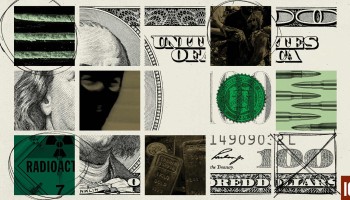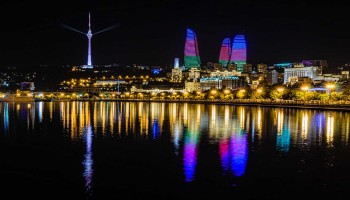More than 400 journalists in 88 countries worked together for 16 months on this investigation. Together they scoured over 2,100 confidential reports filed to the U.S. Treasury Department’s intelligence unit over the course of several years. In total, they have produced dozens of stories on what they found.
Below is a selection of interesting snapshots that reporters from OCCRP and our member centers found in the FinCEN Files. They show how a notorious Ukrainian arms dealer was able to move dollars even after he was accused of trying to smuggle weapons from North Korea to Iran; detail the underground financial network both a Russian organized crime group and the boss of a state-owned company used to shift their cash; and expose how Lithuania’s largest company has been secretly selling fuel to the separatist region of Transnistria for years.
Watch this space for more finds from the FinCEN Files in coming days and weeks.
-
1
FinCEN Files Show How a Notorious Weapons Dealer Moved Money Abroad
An offshore firm tied to an infamous Ukrainian arms broker was able to keep trading dollars for years after he was accused of trying to smuggle weapons from North Korea to Iran, OCCRP can reveal. A report from the FinCEN Files shows a company linked to Yury Lunov made dollar transactions through its Estonian bank account via Deutsche Bank America’s correspondent accounts as late as 2014 — and it appears to still be dealing arms today.
-
2
Russian Gang Leader and State Company Boss Used Same Underground Network to Move Illicit Funds
What connects an organized crime group that illegally moved over $2 billion out of Russia and the boss of a state-owned military supply firm who allegedly took kickbacks? Both, according to suspicious transaction reports in the FinCEN files, may have relied on the same underground financial network to move their money.
-
3
Russian Billionaire’s Offshore Firm Paid Millions to Vladimir Putin's Adviser
An offshore holding company owned by billionaire Alisher Usmanov paid an adviser to Russian President Vladimir Putin $6 million over two years, according to a report in the FinCEN files. The payments to power broker Valentin Yumashev — whose companies span the telecom, mining and media industries — for a “services” agreement were flagged due to fears of corruption.
-
4
Real Knitting, Dubious Transactions
The Real Knitting factory in northwest Serbia touts itself as a “successful Italian knowhow company” and it has received almost $2 million in state handouts. But leaked bank filings show it actually belongs to an Armenian with a track record of running law-breaking factories, who owns it through a Hong Kong company that has spent years moving large sums of money around the world for no discernible reason.
-
5
Leaked Data Exposes Covert Lithuanian Trade with Transnistria
Lithuania’s largest company has secretly been supplying fuel to the breakaway region of Transnistria in Moldova for years. A leaked bank filing reveals oil refiner Orlen Lietuva was paid $4.4 million by Transnistria’s powerful Sheriff conglomerate — while disparities in trade data indicate this may be just a fraction of the petrol that has been shipped from Lithuania to the separatist region through Ukraine to avoid paying duties.
-
6
Russian Telecom Giant Paid Over $5 Million to an Offshore Firm Implicated in Embezzlement
Russian telecommunications giant MTS sent over $5 million to a British Virgin Islands company that was named in a corruption and embezzlement investigation and linked to the son of a powerful former Azerbaijani minister. Both of the companies involved in the transactions, which were flagged in a filing to U.S. authorities, have since been implicated in bribery schemes.
-
7
Despite Red Flags, Banks Kept Moving Money for Company Involved in Huge Bitcoin Scandal
Leaked bank records shed light on a money laundering scheme that collapsed after a probe by U.S. authorities.
-
8
Why Barclays Axed Serbian Mining Giant
The bank investigated six key figures from Mineco, as well as 11 subsidiaries and affiliates, uncovering 109 transactions from 2010 to 2015. Ninety-nine were reported to FinCEN.
About This Investigation
The FinCEN Files is a 16-month-long investigation by the International Consortium of Investigative Journalists, BuzzFeed News and more than 400 international journalists in 88 countries, including those from OCCRP and its network of member centers.
FinCEN Files Show How a Notorious Weapons Dealer Moved Money Abroad
An offshore firm tied to an infamous arms broker was able to keep trading in dollars despite his alleged involvement in major international weapons smuggling, the FinCEN Files reveal.
On December 11, 2009, Thai police boarded a Soviet-built Ilyushin cargo plane refueling in Bangkok en route from North Korea to Iran and found it loaded with 35 tons of weaponry, in flagrant breach of U.N. arms sanctions on both countries. Images of the mysterious plane with tail number 4L-AWA flew around the world.
An investigation by the U.N. Panel of Experts on North Korea established that the New Zealand-based shell firm SP Trading was behind the shipment and was owned by Ukrainian arms broker Iurii Lunov, operating together with Kazakh aviation businessman Aleksandr Zykov.
Ten weeks after the incident, Deutsche Bank Trust Company Americas filed a Suspicious Activity Report (SAR) to U.S. authorities on SP Trading, followed by a second SAR in 2011 about the notorious formation agent who had registered the firm.
But OCCRP has found that, despite having flagged SP Trading as suspicious back in February 2010, Deutsche Bank’s U.S. subsidiary was still processing dollar payments four years later for an offshore firm believed to have links to Lunov. Deutsche Bank did not immediately respond to a request for comment.
Dollar wire transactions require the involvement of a U.S. bank even if, as in this case, the transfer is for an account at another bank.
Back in 2010, Lunov’s SP Trading was a customer of the notorious Estonian branch of Danske Bank, which has been accused of laundering hundreds of billions of dollars and closed in 2019. Deutsche Bank’s U.S. subsidiary was the correspondent bank to Danske, providing dollar transactions for its customers, including SP Trading.
Although the SP Trading scandal broke in December 2009, Danske did not close the company’s account until Lunov asked them to do so five months later, according to emails obtained by OCCRP. In their correspondence, he thanked the bank for its collaboration.
The fact that SP Trading went “unchallenged and ignored” shows how bad the situation is, said Martin Woods, an anti-money laundering expert. “An entire supply chain of supposedly regulated businesses, including banks and company formation agents as well as official government company registration offices fail[ed] to act.”
The emails also reveal that Lunov had a second account with the Danish bank in the name of a U.K. shell firm, Ostwest Alliance Ltd, which was also involved in arms dealing.
“It is clear that we should have never had that portfolio of non-resident customers,” Danske Bank’s Chief Compliance Officer Philippe Vollot told OCCRP and FinCEN Files reporters. “It is also clear that we were too slow in realising the extent of the issues and to close it down.”
Red Flags, Checkered Past
Lunov requested that Danske close both accounts in April 2010 and asked for the balance to be transferred to a bank account belonging to a recently created Cyprus firm, Esselex Investments Ltd.
While this indicates that Lunov had ties to Esselex Investments, their exact relationship is unknown. Ownership of the Cypriot company records is hidden behind proxies, but like Ostwest, Esselex declares itself to be an arms trader in its articles of incorporation.
Esselex was still able to make dollar transactions through its Estonian bank account via Deutsche Bank Americas correspondent accounts as late as 2014, another SAR from the FinCEN Files reveals. (Given offshore secrecy, it is not clear whether Lunov still had a relationship to Esselex at that point.)
The SAR flagged $8.5 million in payments from Esselex and other shell companies to a British firm called Samertaym LLP over two weeks in June and July 2014, through Deutsche Bank. Deutsche Bank noted that these transfers had no clear business purpose and raised suspicions of money laundering.
Esselex still exists. In 2016, it was listed as the purchaser in a draft contract with UK firm S-Profit Ltd for the sale of an S-125 M1 Pechora anti-aircraft system for $3.9 million.
OCCRP and Amnesty International obtained the contract while investigating S-Profit for intent to breach an EU arms embargo on South Sudan but could not confirm whether the contract was implemented or not.
Lunov did not respond to questions sent by OCCRP, nor to repeated phone calls.
- Graham Stack
Russian Gang Leader and State Company Boss Used Same Underground Network to Move Illicit Funds
Suspicious activity reports filed by U.S. banks reveal that an organized crime group that illegally extracted over US$2 billion from Russia, and the boss of a state-owned military firm who allegedly took kickbacks, may have relied on the same underground financial network.
Sergei Magin, the leader of one of the largest “dark money” organized crime groups in modern Russia, was released from a prison colony in March 2019 after serving almost eight years. His criminal enterprise reportedly managed to extract more than $2 billion from banks in Russia and cash out the money abroad. Magin — whose gang nickname is "Seryozha Two-Percent," a nod to his service fee — and his accomplices reportedly made more than $10 million in commissions for the schemes.
Three months before Magin's release, Leonid Teyf, the former deputy head of Russia’s state-owned military supply company, Voentorg, was arrested in the U.S. on corruption-related charges. U.S. authorities allege that Teyf, his wife Tatyana, and their accomplices embezzled $150 million from Russia, and that Teyf took kickbacks from contractors working for Voentorg, which is owned by Russia’s Ministry of Defense. Over $39 million was transferred to U.S. bank accounts that belonged to the Teyfs and their accomplices.
The FinCEN Files reveal that Tatyana Teyf received money from a Hong Kong company that had just received millions from a Russian company Magin used in his extraction scheme. According to an indictment, a total of $2 million was transferred from Hong Kong into Teyf’s U.S. bank account.
Suspicious Activity Reports filed by the New York branch of Standard Chartered Bank show that Hong Kong-based Ringo Trading Limited transferred $391,900 into Teyf’s account, for debt repayment in December 2012. In the weeks before, Ringo Trading had received more than $5.4 million from the Russian company Premier Group for the transport of unnamed goods.
Ringo Trading had already been flagged as suspicious in Hong Kong because the entity appeared to be a "pass-through" vehicle for transferring funds, according to the bank report.
A document seized by investigators during a search of Magin's apartment, and obtained by OCCRP’s Russian partner Important Stories, lists the names of Russian companies used by Magin’s network to move money out of Russia, as well as the destination jurisdictions where that money would be withdrawn. Premier Group was on the list in connection with Hong Kong.
Magin was released eight months early after paying a fine of around $3,000. Leonid Teyf faces up to 20 years in an American prison, while his wife and other accomplices face up to 10 years. In addition to money laundering and other financial crimes, Teyf is accused of planning the murder of his wife's lover.
Russian Billionaire’s Offshore Firm Paid Millions to Vladimir Putin's Adviser
An offshore holding company owned by billionaire Alisher Usmanov paid an adviser to Russian President Vladimir Putin US$6 million between 2006 and 2008. The payments to the adviser, Valentin Yumashev, from Epion Holdings Ltd, a company registered in the British Virgin Islands, were reported to U.S. authorities by JP Morgan Chase Bank because of corruption risks. The bank listed a generic “services” agreement as the reason for the transactions.
Before Yumashev worked for Putin, he headed the administration of his father-in-law and first Russian president Boris Yeltsin. According to reporting by Russian news outlet Meduza, Yumashev “personally” chose Putin as Yeltsin’s successor two decades ago.
In 2018, the Kremlin's website announced the appointment of Yumashev as an unpaid, voluntary adviser to the Russian president. Putin’s press secretary clarified that Yumashev had actually held this position since 2000.
It’s unclear what kind of services Yumashev provided to Usmanov, whose companies span the telecommunications, mining and media industries. An acquaintance of the presidential adviser alleged in an interview with Russian newspaper Vedomosti that Yumashev has been working as a lobbyist since 2000.
“He has access to the corridors of power, and a call from him to ministers, heads of large companies, and to powerful businessmen isn’t something out of the ordinary. His circle of connections is wide. Yumashev is respected, he’s perceived as a person close to Vladimir Putin, and as someone who acts with [the president’s] approval,” said the unnamed source.
Yumashev reportedly settled a business conflict between the billionaire co-owners of Norilsk Nickel, Oleg Deripaska and Vladimir Potanin. Deripaska was married to Yumashev’s daughter until 2018 and, according to an interview the presidential adviser gave to Russian newspaper MK in 2011, the oligarch subsidized the family’s expenses.
“If we earned millions, then somewhere they must be physically represented. But neither Tanya nor I have any planes or villas in France or England,” Yumashev said, referring to his wife. “If in 2001 my daughter had not married Oleg Deripaska, we would have had a significantly different standard of living," he added.
That was three years after Yumashev received $6 million from Usmanov’s company for unknown services.
Neither Yumashev nor Usmanov responded to requests for comment.
Real Knitting, Dubious Transactions
In the quiet village of Gajdobra, in northwest Serbia, sits a hosiery factory touted by the government as a shining example of the kind of foreign investment the country needs.
Since its arrival in 2011, the Real Knitting factory, which produces tights and socks for export and has been presented in Serbian media as a Russian-Italian venture, has received almost 2 million euros in government subsidies. It was even granted a plot of state-owned land in 2014 so it could expand its operations.
On a sleek website, Real Knitting touts its Italian provenance, calling itself “the story of a successful Italian know how company driven by a true entrepreneurial spirit.”
But all may not be as it seems with Real Knitting. It is actually owned by a Serbian firm, while its parent company, Alpha Retail Group Ltd, is registered in Hong Kong and owned by an Armenian citizen living in Lithuania.
And for several years, Alpha Retail has been moving large amounts of money across the world for unclear reasons.
One of these questionable transactions, around $1.2 million, was sent to the Real Knitting factory at the beginning of 2013.
The transaction was among 723 other “suspicious wires” flagged by Bank of New York Mellon as part of a review of dollar transfers it had processed on behalf of Latvia’s Norvik bank (now called PNB Banka).
This information came to light as part of the FinCEN Files, a 16-month-long investigation by the International Consortium of Investigative Journalists, BuzzFeed News, and OCCRP based on top-secret bank reports filed to the U.S. Treasury Department’s intelligence unit.
The bank noted that the transfer was suspicious because it was made by a shell company, its origin was not known, and it was transferred through jurisdictions considered high risk for money laundering — in this case, via Latvia.
Representatives of Real Knitting and Alpha Retail did not respond to multiple requests for comment.
Journalists from KRIK and OCCRP researched Serbian company records and discovered more oddities.
In addition to the $1.2 million flagged by BNY Mellon, over $7 million in U.S. dollars and 17.9 million euros were wired from Alpha Retail to its Serbian factory, in 49 separate transactions, all described as loans, between 2011 and 2015. After the money arrived, the factory’s sole shareholder, Alpha Retail, decided to repay the funds to its bank account in Singapore. (It is unclear how exactly how much of the total was paid back.)
Experts who viewed the documents said the transactions were difficult to explain by normal patterns of business activity.
“It is not possible to determine the origin of the money that arrived [in Serbia] as loans from the mother company,” said independent auditor Ljubisa Stanojevic.
Alpha Retail Group was founded by a Russian, Alexandr Viktorovich Efimenko, but the company’s ownership was transferred three separate times, finally ending up in 2017 in the hands of Armenian businessman Koryun Chilingaryan, who is based in Lithuania, according to documents from the Hong Kong business registry.
Before taking over the firm, Chilingaryan managed two textile companies in Lithuania, both of which were fined for illegal activities. In one case, his textile company was dinged by Lithuanian tax inspectors for not paying taxes. A second company he managed, which sold Italian underwear, was fined for employing workers illegally.
The Real Knitting factory in Serbia was also fined by labor inspectors two years ago because it didn’t have adequate worker safety equipment or allow workers to have weekends off.
The factory employs around 600 people, many of them commuting to Gajdobra from surrounding villages.
Factory workers complain of sweatshop conditions
- Bojana Jovanović, Sara Smolović, Dragana Pećo, Šarūnas Černiauskas
Leaked Data Exposes Covert Lithuanian Trade with Transnistria
Sandwiched between Moldova and Ukraine, the self-proclaimed state of Transnistria still bears the hammer and sickle of the Soviet Union that gave it birth on its flag. Miles away in the Baltic state of Lithuania, where the collapse of the USSR began, that same symbol is officially banned.
But despite their very different ideologies, Lithuania’s largest company has been quietly trading with the separatist-controlled region of Moldova for years.
Details from a cache of leaked bank reports show Orlen Lietuva — which is largely owned by the Polish state and operates the only oil refinery in the Baltics — has sold millions of dollars worth of petroleum to Transnistria’s largest corporation, Sheriff LLC. Discrepancies in official trade figures indicate the value of Orlen Lietuva’s Transnistrian sales could even stretch into the tens of millions.
Most of these fuel exports appear to have been routed through Ukraine into Transnistria to avoid paying import duties to Moldova, international trade data suggests.
Transnistria, a narrow strip of land east of the Dniester river on Moldova’s border with Ukraine that declared independence after Russia-backed separatists fought a brief civil war in the early ’90s, is not subject to European Union sanctions on trade, so the shipments are not illegal. But Laurynas Jonavicius, a political scientist based in Vilnius, said revelations that Orlen Lietuva had been supplying Sheriff and bypassing Moldovan import tolls could cause a scandal in Lithuania, Moldova, and Poland.
“If that is true, this could be a story with resonance,” he told OCCRP.
Sheriff is the most powerful company in Transnistria, a sprawling behemoth with interests in everything from petrol stations, hotels, and supermarkets, to a TV channel and the region’s major telecoms network. Its holdings also include large regional bank Agroprombank and Moldovan football champions F.C. Sheriff Tiraspol. Its yearly sales typically exceed Transnistria’s annual budget.
Founded by two former security officers, the conglomerate also has wide-reaching political influence. As well as sponsoring the ruling party and subsidizing the state, Sheriff has also reportedly influenced the choice of top Transnistrian politicians, including the current president.
Jonavicius said Sheriff has a “monopoly on all aspects” of life in Transnistria. “Trade, economy, energy, legal business, illegal business, sports, culture — whatever you pick, it’s connected to Sheriff,” he explained.
A leaked Suspicious Activity Report (SAR) filed by HSBC Bank U.S.A. in May 2016 flags one of Sheriff’s founders and the company's director at the time, Ilya Kazmaly, as a “politically exposed person. It also lists Orlen Lietuva as Sheriff’s top trade partner in Lithuania, noting the oil refiner received $4.4 million through Agroprombank between April 2012 and October 2015.
In total, HSBC reported 95 transactions by Sheriff totalling almost $8.3 million. Orlen Lietuva received more than half of that amount in 16 wire transfers.
Other sources suggest the scope of Orlen Lietuva’s Transnistrian trade could be far larger. While Orlen Lietuva never mentions Sheriff or Transnistria in its official annual reports, Sheriff lists the Lithuanian refiner among its principal suppliers, using its old name, Mazeikiu Nafta.
Disparities in trade data also indicate significant amounts of refined oil may have flowed from Lithuania into Transnistria through Ukraine. For many years Chișinău had no authority over the separatist region’s eastern border, so goods imported via this route were not counted in official statistics or subject to Moldovan duties.
U.N. Comtrade data show Lithuania exported $131.37 million worth of fuel to Moldova between 2011 and 2019, but Moldova only recorded importing $37.38 million worth of petrol products from Lithuania over the same period. That means up to $94 million of petrol products may have made their way into the breakaway region through Ukraine.
Victor Parlicov, who was the chairman of Moldova’s national energy regulatory body when Lithuania’s petrol exports were peaking, said the disparity in the data is likely down to Transnistria’s imports. The discrepancies started in 2010, when Moldova started raising excise duties on fuels, and grew rapidly. By 2016, U.N. data shows Lithuania was declaring almost eight times as much in fuel exports as Moldova was declaring in imports.
At that time, Parlicov told OCCRP, “Sheriff definitely was not licensed [as an importer] and definitely was not giving accounts to Moldova about their oil imports.” He said the Transnistrian company only registered as a Moldovan fuel importer in 2018.
Lithuania’s official fuel exports to Moldova had dropped dramatically after 2017, when Moldova and Ukraine began implementing joint customs controls on the Transnistrian border. They began at the Pervomaisc-Kuchurgan checkpoint, which Ukraine’s Hromadske TV reports is responsible for most illegal trade flows in the region.
Orlen Lietuva confirmed its petrol exports to Moldova largely tallied with Lithuania’s official statistics. The company said its exports to Moldova had decreased, not because of any change in policy there or in Ukraine, but “due to an increased demand in Poland.” U.N. statistics, by contrast, show that Lithuania’s exports of petroleum products to Poland have actually been decreasing, falling from 1.35 million tons in 2015 to less than half that four years later.
Sheriff’s central office in Tiraspol at first declined to give further comment for this article, then promised a response from the company’s lawyers, which did not arrive in time for publication.
A Sweet Trade
- Šarūnas Černiauskas, Vladimir Thorik
Russian Telecom Giant Paid Over $5 Million to an Offshore Firm Implicated in Embezzlement
Russian telecommunications giant MTS sent US$5.37 million to a British Virgin Islands company linked to the son of a former Azerbaijani minister, documents from the FinCEN Files show. The payments were ostensibly for telecom-related services, but both companies have since been implicated in bribery schemes.
New York-based Deutsche Bank Trust Company Americas reported the transactions to U.S. authorities in what is known as a Suspicious Activity Report. While a SAR is not an allegation of criminal activity, banks file them to let the U.S. financial intelligence agency know when they see transactions that might be problematic.
The British Virgin Islands firm, Caspian Telecommunication Ltd., was little known but doing big business with state-owned telecom companies in Azerbaijan and Belarus. In 2015, Caspian’s subsidiary, Cartburg Networks Corp, signed a cooperation agreement with Belarus’s Beltelecom to provide telecom services to clients in both countries.
Then in December 2015, Caspian’s owner, Ayaz Kerimov, was indicted on embezzlement charges following an investigation into bribes paid to officials at Azerbaijan’s Ministry of Communications. Investigators found that the person actually controlling Cartburg Networks was Anar Mahmudov, the son of Azerbaijan’s former Minister of National Security. One of the Ministry of Communications officials arrested in the embezzlement case was a Mahmudov family member, according to local press reports.
Anar Mahmudov’s father, Eldar Mahmudov, was dismissed from his powerful post as Azerbaijan’s national security minister in October 2015, and his associates were reportedly arrested on various charges linked to corruption and extortion.
The Mahmudov family has reportedly amassed a sizable fortune during the minister’s decades in government — including through state contracts — and invested more than 100 million euros in companies and real estate in the UK, Spain, Luxembourg, Lithuania, and Cyprus. Anar Mahmudov and his sister reportedly oversaw the family businesses.
Anar Mahmudov and his lawyers did not respond to requests for comment on the payments. An MTS spokesperson told OCCRP, “MTS has no business in Azerbaijan and never had any. In December 2013 MTS and Caspian Telecommunication signed a typical agreement for international communication service,” giving each other’s users access to services in their respective areas of coverage.
“The agreement was valid in 2014-2015 and the payments were made from both parties involved,” the spokesperson added.
However, MTS has a history of dodgy dealings in Central Asia. The company entered into a non-prosecution agreement with U.S. authorities when they indicted the daughter of Uzbekistan's former president, Gulnara Karimova, for taking bribes from telecom companies in exchange for lucrative state contracts. MTS agreed to pay $850 million to the U.S. Department of Justice to settle allegations that its subsidiary in Uzbekistan was one of the companies involved in the bribery scheme.
Despite Red Flags, Banks Kept Moving Money for Company Involved in Huge Bitcoin Scandal
Russian businessman Sergei Mayzus has spent the past three years on his estates in the Czech countryside breeding livestock, brewing beer, and trying to reestablish his reputation after becoming embroiled in one of the biggest scandals in cryptocurrency history.
His company, MoneyPolo, is a popular online money transfer service that was often used to move funds in and out of Bitcoin exchange platform BTC-e, which collapsed in 2017 after U.S. prosecutors indicted it as a major vehicle for laundering illicit money.
But data from the FinCEN files – a 16-month investigation by the International Consortium of Investigative Journalists, Buzzfeed news and more than 400 other journalists – show MoneyPolo was being red-flagged to U.S. regulators for its unusual business transactions as early as 2010.
In fact, the company behind it, Mayzus Financial Services (MFS), is the most recurring subject in the more than 2,100 Suspicious Activity Reports (SARs) that were leaked.
American prosecutors allege that criminals from all over the world used BTC-e to change traditional currencies for Bitcoins, helping them to clean $4 billion of dirty cash from illicit sources, including drug trafficking, a Bitcoin theft from a Japanese exchange, and Russian hackers.
MoneyPolo helped BTC-e process bank transactions exceeding $100 million through accounts at Czech banks.
Since the scandal broke, Mayzus has been waging legal battles to restore his damaged reputation from his chateau in southern Czechia. He also owns a former manor house, now used as a farm, and used to own another chateau in the mountains where his son could go skiing.
Mayzus told Investigace.cz his current business is “nothing unusual.”
"I brew beer, run an agricultural company and learn the secrets of wine production," he said.
An investigation by Deutsche Bank’s Americas branch, included in the FinCEN files, found more than $250 million moved through accounts linked to Mayzus’ companies between January 2010 and July 2013.
As of 2016, Investigace.cz’s analysis shows that at least $500 million flowing through Czech bank accounts linked to Mayzus had been flagged as suspicious to U.S. authorities.
MoneyPolo’s former compliance officer, Igor Sergeev, said the company carried out due diligence on its clients and all control measures required by law. “Management ... did not believe that btc-e.com was more risky than its other clients from the digital currency industry,” he said.
One back and forth contained in the FinCen Files shows officers at Deutsche Bank’s Prague business reassuring their New York-based colleagues, who were raising concerns about BTC-e operator Canton Business Corporation.
Deutsche Bank’s U.S. office started looking into a company controlled by Russian Alexander Buyanov in 2013, when he sent 10 payments of $1,203 each to a Polish citizen in Warsaw — nine on the same day — for no clear business reason. At the time, Buyanov was reportedly working as a DJ in a Moscow nightclub.
“Do you have any reason to believe that the transaction(s) listed are in any way of a suspicious nature?” a New York compliance officer asked. “We don't believe so,” the Prague office replied. “Mr Buyanov was verified personally as we had several meetings before deciding to start the cooperation.”
The conversation revealed that Deutsche Bank Prague considered Canton Business to be a legitimate provider of electronic currencies trading services and that its officers “are communicating with the customer on the daily basis (sic)” over operational issues.
The reassurances don’t seem to have been enough, however, and Deutsche Bank New York filed a SAR on 1 April, 2014.
Deutsche Bank declined to comment for this story. “Legal restrictions prevent us and other banks from discussing potential SARs,” said spokesman Tim-Oliver Ambrosius. “Deutsche Bank is actively monitoring for suspicious conduct and shares relevant findings with the authorities.”
The U.S. indictment alleged Canton Business Corporation, which Deutsche Bank reported was linked to Buyanov, was the co-manager of BTC-e’s platform.
In 2018 Buyanov told Russian investigative journalist Andrey Zakharov that he was not involved in the scheme and had never heard of BTC-e exchange. Zakharov told investigace.cz he believed Buyanov and another Russian, Stanislav Golovanov, were just “dropmen” whose identities had been used to hide the real owners of the companies.
But Sergeev, the former compliance officer at MoneyPolo, disagreed. “The company’s opinion, based on evidence, is that Golovanov and Buyanov have definitely been actively helping Mr [Alexander] Vinnik for a prolonged period of time,” he said.
Vinnik, a Russian citizen, allegedly ran BTC-e through companies he owned. He was arrested in 2017 in the U.S. for using the platform to launder some $4 billion, after which all of MoneyPolo’s accounts with Czech banks were closed.
That year Mayzus sued Vinnik and 16 companies linked to BTC-e in Cyprus. The court ruled in his favour, awarding him and MFS over €38 million. Mayzus said he intends to close MFS once he and the company receive the compensation.
Neither Czech police, nor the financial intelligence agents, would comment on whether they investigated Mayzus' financial companies.
- Jakub Šimák
Why Barclays Axed Serbian Mining Giant
When Barclays Bank learned of OCCRP revelations about the murky goings-on at Serbian-owned mining conglomerate Mineco in 2015, the bank launched an investigation into the firm’s sprawling network of subsidiaries, the FinCEN files reveal.
Two years earlier, reporters had exposed how senior figures at the group were accused of scamming Serbia’s biggest wine producer and bribing a Romanian judge.
Roots in Glencore
The OCCRP reporting set in motion a series of decisions by Barclays that would result in closure of Mineco’s U.K. business account, according to several Suspicious Activity Reports reviewed by reporters. These documents were filed by its New York branch to the U.S. Financial Crimes Enforcement Network (FinCEN).
Barclays investigated six key figures from Mineco, as well as 11 subsidiaries and affiliates, uncovering 109 transactions from 2010 to 2015. Ninety-nine were reported to FinCEN.
Banks file SARs to alert U.S. regulators of unusual or potentially problematic activity, but they are not an accusation or proof of any wrongdoing.
While Barclays Bank doesn’t mention OCCRP by name in its SARs, it explains that the report was written because of “negative news pertaining to various allegations of market manipulation, bribery, espionage and corruption by Mineco and their above listed directors and representatives, as the transactions could potentially represent proceeds of bribery and corruption.”
The SAR then details the OCCRP investigation.
The bank also checked six Mineco directors, but found no evidence that they had banked with Barclays.
In September 2015, a month after the initial SAR was filed, Barclays ended its relationship with Mineco and closed its dollar account, according to a SAR filed that December.
“The fact that the bank decided to close the account of its client due to doubts in legality of its business certainly represents one of the more drastic measures that the bank can take” said Ivan Ljubisavljević, a Belgrade lawyer and expert in commercial law.
Despite Barclays’ concerns, and the ongoing legal troubles of its former top officials, Mineco has continued to thrive in the Balkans, winning major contracts from governments. It is a core partner in an ongoing “IMP@CT” project, a 7-million-euro European Union grant aimed at making the extraction of small mineral deposits more commercially viable. (IMP@CT is short for "Integrated Modular Plant and Containerised Tools.”)
The EU Commission declined to comment.
Mineco also has a number of mining deals with Republika Srpska, the Serb-dominated region of Bosnia and Herzegovina (BiH), and controls other mines in BiH and Serbia. It is building a hydropower plant in the Bosnian town of Zvornik.
Mineco runs five mines in the Balkans and a lead smelter in Russia, and is involved in international metal trading in London and in Zug, Switzerland. In 2018, its turnover was over $200 million.
When contacted for comment, Mineco confirmed that its relationship with Barclays ended in 2015 but said: “Barclays PLC has not informed Mineco Ltd, nor any other company doing business within the Mineco Group about this report, nor asked any questions concerning the transactions.
“All transactions effected by Mineco Ltd through its account with Barclays PLC were legal and legitimate, and were made on the basis of contractual relations.”
OCCRP’s investigation revealed that top Mineco officials were suspected of draining more than 2 million euros from one of Serbia’s biggest producers of wine and brandy. Three Mineco directors were indicted, with two arrested in 2011. That trial is pending.
Aksentijević and an associate, Aleksandar Andrejević, have also been accused of bribing a Romanian judge. They were sentenced to three years of prison in 2018 and both are now fugitives, with an international warrant out for their arrest. Another Serbian, Siniša Bogićević, took over the firm in 2018 after Aksentijević went on the lam.
“None of the Mineco Group companies has ever been the subject of any official charge or involved in any commercial crime,’’ Mineco said in its statement.
The company emphasized that Aksentijevic and Andrejevic are former representatives , although documents show they were involved with Mineco Group at the time of their crimes.
“At the moment, as far as we know, Mr Aksentijević and Mr Andrejević are conducting proceedings before the International Court of Human Rights against Romania for gross violations of their rights,” the company said, adding that it would “decline to comment on the Court judgement or any further developments, especially since all legal remedies in this respect have not yet been exhausted”.
Mineco also works closely with Kosovo’s Trepča mine, which is controversially divided between two state-owned companies controlled separately by the Kosovar and Serbian sides. Mineco’s transactions with Trepca were flagged in a separate SAR, this one filed by the Bank of New York Mellon as it investigated the actions of the controversial Tanzanian bank FBME, which counted Mineco as a client.
“In 2013 and 2014 Mineco International Limited purchased lead and zinc ore concentrates from Trepča under Pak (the Privatization Agency of Kosovo). We do not understand why anyone would highlight any of our transactions as suspicious,” Mineco wrote.
- Jelena Vasić







